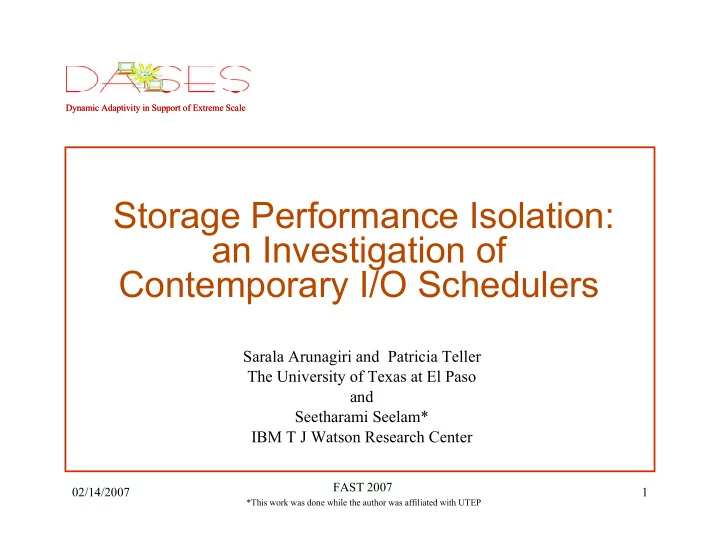

Dynamic Adaptivity in Support of Extreme Scale Dynamic Adaptivity in Support of Extreme Scale Storage Performance Isolation: an Investigation of Contemporary I/O Schedulers Sarala Arunagiri and Patricia Teller The University of Texas at El Paso and Seetharami Seelam* IBM T J Watson Research Center FAST 2007 02/14/2007 1 *This work was done while the author was affiliated with UTEP
Functional Components of QoS Dynamic Adaptivity in Support of Extreme Scale FAST 2007 02/14/2007 2
Metrics Used Dynamic Adaptivity in Support of Extreme Scale FAST 2007 02/14/2007 3
The Question Dynamic Adaptivity in Support of Extreme Scale Given limited − Amount of over provisioning − Knowledge of I/O stream characteristics Question: Do the scheduling algorithms provide Absolute Performance Isolation? Most schedulers/tools/frameworks Demonstrate performance isolation using workloads satisfying implicit assumptions FAST 2007 02/14/2007 4
Investigation Dynamic Adaptivity in Support of Extreme Scale Schedulers/tools Absolute Performance Isolation Cello disk scheduling Yes framework CFQ-CRR(P) Yes YFQ No Facade virtual store No controller Interposed 2-Level No scheduler Triage workload controller, No both file and block access SLEDS-storage controller, Policy can be set to achieve the goal. block level storage Heuristic presented does not provide service Absolute Performance Isolation. Chameleon-storage Policy can be set to achieve the goal. resource arbitrator FAST 2007 02/14/2007 5
More Questions Targeted at Storage Service Providers Dynamic Adaptivity in Support of Extreme Scale In practice, from a storage service provider's point of view, is Absolute Performance Isolation a desirable property? Are the current schedulers satisfactory in this context? Is there a cost-benefit in trying to design new algorithms to tackle this problem? ... and many more questions FAST 2007 02/14/2007 6
Current Work Dynamic Adaptivity in Support of Extreme Scale Design of a Scheduler that addresses the issue of Absolute Performance Isolation For more information http://research.utep.edu/daises sarunagiri@utep.edu seelam@us.ibm.com pteller@utep.edu FAST 2007 02/14/2007 7
Recommend
More recommend